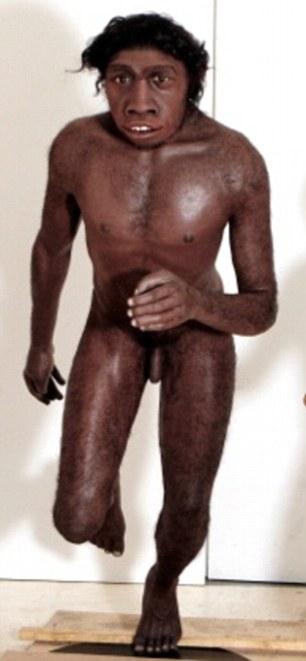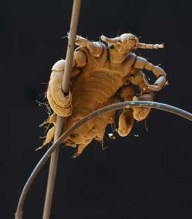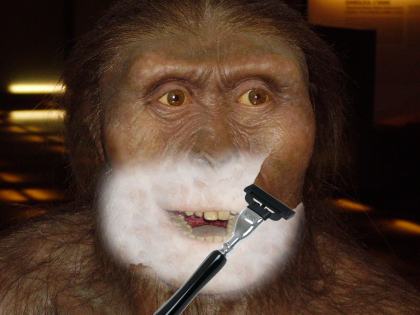The title of this post is a bit of a lie, humans aren’t actually furless (and I’m not just talking about the hair on our head). In actual fact humans have as much hair as chimps do, completely covering our body. The difference is that our hair is incredibly fine, to the point where most of it is basically invisible to the naked eye. As such we get none of the insulating or visual benefits of the more furry animals1.
These are fairly significant benefits. Living in the chilly north of England I can think of at least 11 months of the year where a nice furry pelt would be helpful. This is why our fine fur is almost unique in the natural world with only a handful of other land mammals (and no primates) possessing similar hair. If you must know, our furless friends are elephants, rhinos, hippos, pigs and naked mole-rats2.
So why are humans the only primate to have become, for all intents and purposes, furless? Answering this question is very difficult given that skin doesn’t fossilise. As such we can’t identify when our fur became so fine, which stops us figuring out what environmental, behavioural or technological factors may have prompted the change.
Nonetheless, scientists are an innovative bunch and through mathematical modelling and investigations of living creatures (both furred and unfurred) have developed a range of hypotheses that could explain why humans are naked1. These can be grouped into 3 broad categories: thermoregulation, parasites and sexual selection. The aquatic ape silliness could count as a fourth category3, but I like to pretend that doesn’t exist.
Thermoregulation
The thermoregulatory hypotheses basically state that our ancestors began doing something that meant they accumulated too much heat. Since fur is a great insulator, the extra heat would’ve been difficult to get rid of. This would’ve acted as a strong selection pressure; driving our ancestors to become naked so we could dump the excess heat and get on with doing whatever it was we were doing1.

Homo erectus was one of the earliest runners so may have been our first furless ancestor
The various hypotheses disagree over what the activity that resulted in all this heat was. Some suggest running over long distances, probably to hunt, was what got us hot and bothered4. Others think that merely walking out onto the hot, open Savannah was enough to tip us over the edge5. Alternatively fire and/or clothing may have rendered fur useless, or perhaps even detrimental6. If our ancestors kept a fire burning through the night to ward of predators then we might have begun to overheat if we were hairy!
In all of these cases the behavior at the root of the problem was very beneficial, hence why there was a strong evolutionary pressure to keep doing it and stop suffering from overheating as we did so.
However, most these thermoregulatory hypotheses suffer from a critical flaw: insulation works both ways. Not only does hair help trap heat, but stops us absorbing as much heat from the surrounding environment. As such fire or walking out onto the sunny Savannah would not result in significant leaps in a hairy hominin’s body temperature2.
As such the only thermoregulatory hypotheses which actually work are those which claim our ancestors did something that significantly raised their internal body temperature for a period of time, like endurance running. Perhaps chasing down prey over long distances was what prompted our current nudity4.
Parasites

Human lice can infest humans and sometimes carry typhus. Losing hair removes their habitat
Parasites are a problem for all primates, carrying lots of nasty diseases. Most species have to groom each other to try and keep their numbers down but humans don’t. This is because the number of parasites on our body is relatively small since they’re limited to hairy regions of the body. Even when their numbers do occassionally get too high, its easy to remove them by simply cutting their hair. Many hunter-gatherers mimic this practice, with Australian Aboriginals burning the hair short if someone is overly burdened by tics2.
This has led some researchers to suggest that the primary reason our ancestors began to lose their hair was to decrease the habitat of parasites. This would’ve made us less likely to suffer from parasite infestations, and have fewer parasites altogether. By cutting out these disease bearing bugs our ancestors would’ve significantly improved their overall health2. This became possible once hominins developed fire or clothing, which made fur unnecassary. Currently the oldest dates for fire use are ~1.8 million years old (although these examples are debatable7).
Under this model, Homo erectus was the first of our kind that could’ve been hairless2.
Sexual selection
Sexual selection hypotheses aren’t really distinct from parasite or thermoregulatory ones. Rather, they suggest that being naked is kind of noticeable (even if the species had invented clothes). This made hairlessness a good signal that the naked individual was a good hunter, in the case of endurance running, or was healthy and tic free. Thus being naked was a sign you were a good mate, and sexual selection would’ve taken over2.
Interestingly, Darwin was one of the first to suggest sexual selection played a role in human nakedness in his book The Descent of Man. Since 1871 the hypothesis has gone in and out of favour. Many like it, noting that pretty much everyone ever examined has a preference for a mostly hairless mate. On the other hand, loss of hair is often a sign of disease, so many seriously question whether or not nakedness would ever be an attractive trait1.
This criticism conveniently forgetting that it is viewed as an attractive trait by most modern people.
So why are humans hairless?
Apologies, but after making you read almost 1,000 words there is no final answer to be had. Until we can figure out just when our ancestors developed super-fine hair it’s difficult to figure out just why that we became naked. So we’re left with the idea it was linked to a high heat generating activity, like endurance running, or to reduce the number of parasites we have to deal with. Plus a bit of sexual selection, depending on how much credence you give evolutionary psychology.
Of course, whilst studying human evolution we’re often tempted to look for the silver bullet explanation; a single hypothesis that can explain everything. This need not be the case. It might well be that both parasite reduction and thermoregulation were strong motivators for hair loss.
But then, it might be that none of the explanations for our nakedness are correct. What if…

References
1. Rantala, M. J. (2007). Evolution of nakedness in Homo sapiens. Journal of Zoology, 273(1), 1-7.
2. Pagel, M., & Bodmer, W. (2003). A naked ape would have fewer parasites.Proceedings of the Royal Society of London. Series B: Biological Sciences,270(Suppl 1), S117-S119.
3. Hardy, A.C. (1960). Was man more aquatic in the past? New Scientist 7, 642–645
4. Ruxton, G. D., & Wilkinson, D. M. (2011). Thermoregulation and endurance running in extinct hominins: Wheeler’s models revisited. Journal of human evolution, 61(2), 169-175.
5. Ruxton, G. D., & Wilkinson, D. M. (2011). Avoidance of overheating and selection for both hair loss and bipedality in hominins. Proceedings of the National Academy of Sciences, 108(52), 20965-20969.
6. Kushlan, J.A. (1980). The evolution of hairlessness in man. Am. Nat. 116, 727–729.
7. Gowlett, J. A., & Wrangham, R. W. (2013). Earliest fire in Africa: towards the convergence of archaeological evidence and the cooking hypothesis. Azania: Archaeological Research in Africa, 48(1), 5-30.

